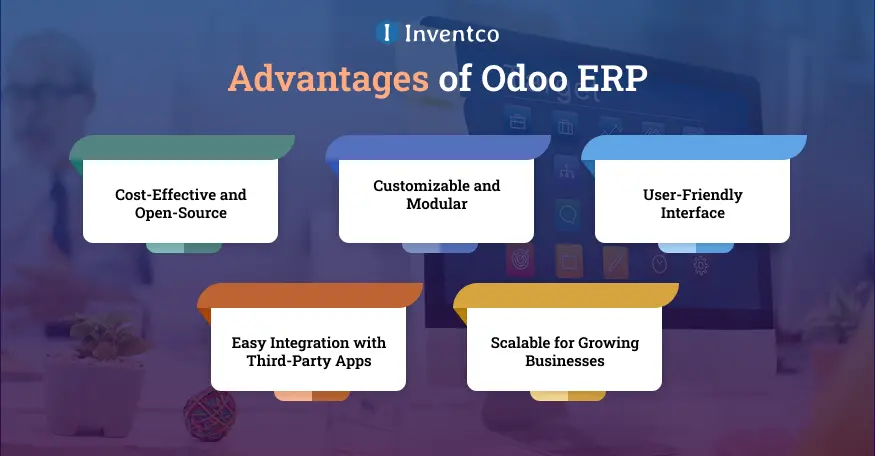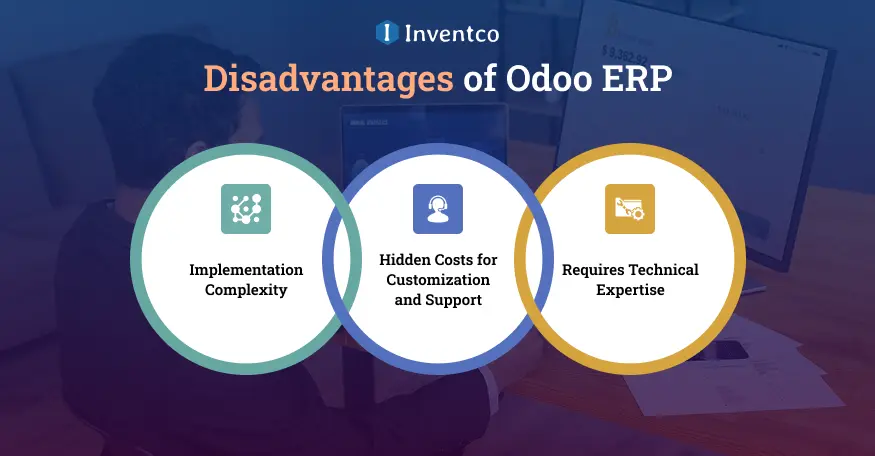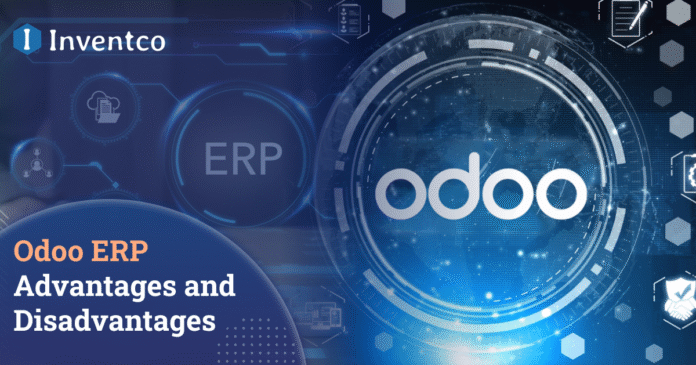Odoo ERP is one of the leading open-source enterprise resource planning solutions for all sizes of businesses. Odoo offers a modular and flexible platform to manage operations efficiently.
They offer a wide range of modules that include HR, inventory, CRM, and accounting. Odoo ERP allows you to organize and streamline processes, which enhances business productivity and helps you to take data-driven decisions.
You get so many leverages by using the Odoo ERP, like scalability, customization, and seamless integration with third-party APIs, which make Odoo an ideal option for growing enterprises.
As we know, every system has its own pros and cons, so in this blog, we spotlight Odoo ERP advantages and disadvantages, and see the overall suitability for your enterprise.
What is Odoo?
Oddo is a complete ERP system that combines multiple business apps into a single integrated platform. Odoo combines the business modules of CRM, accounting, inventory, and HR, through which you can manage your business operations efficiently and reduce the workload.
With the help of a modular approach, Odoo ERP allows enterprises to select the features they need, which makes it highly flexible for business requirements. With the help of this adaptability, organizations can scale their ERP system as they grow without complexity and unnecessary cost.
For growing businesses that are looking to improve productivity, better decision-making, and streamline work processes, Odoo ERP is the best choice, due to its open-source nature and customizable frameworks.
What Type of Enterprises Use Odoo ERP?
Odoo ERP is built for all types of businesses to help them stay organized and competitive by integrating multiple applications into a single platform, which saves their time and costs.
1. Small and Medium Enterprises (SMEs)
Small and medium enterprises usually need a cost-effective enterprise resource planning system that can grow with their business. Odoo helps these businesses start small and add additional features as required, thanks to its modular and scalable design. With the help of Odoo ERP, SMEs can manage their workflow, inventory, accounting, and customer relationships efficiently.
2. Businesses with Diverse Operations
Odoo is a versatile platform; businesses of retail, e-commerce, manufacturing, and service providers can also benefit from Odoo. With the help of Odoo modules, it can easily handle various processes, which makes it suitable for diverse industries.
3. Startups and Growing Companies
Startups and growing companies always need flexibility, which is what Odoo actually gave them, with the highly flexible modular options. Odoo can help these growing businesses to align with their business needs as their operations change, and it can reduce the cost and workload.
Key Features of Odoo ERP
Why is Odoo so helpful? The reason is Odoo ESP integrates its powerful modules and flexible tools to align business operations and improve their efficiency, and support them in the growth across industries.
Here are some of the Key Features of Odoo ERP, have a look:
1. Modular Design
- You can select applications as per your business needs, such as inventory management, Sales, CRM, accounting, project management, and HR.
- It allows enterprises to expand their features as they grow.
2. Customization
- You can customize the workflow, dashboard, and processes to meet your business needs.
- It supports industry-specific needs across various sectors.
3. Integration Capabilities
- You can easily integrate third-party tools and apps for seamless data flow.
- Enhances collaboration between departments.
4. Automation & Reporting
- With the help of the AI, you can automate routine tasks and generate real-time reports.
- With the help of the Odoo ERP, you can improve decision-making and efficiency for your business growth.
5. Scalability & Flexibility
- Odoo ERP is suitable for all types of businesses, whether it is a startup, SMEs, or a Large enterprise.
- It helps you to manage growth efficiency without requiring a switch to the system.
Advantages of Odoo ERP

There are so many advantages of Odoo ERP that make it one of the popular choices for businesses across industries. Here are some of the top Odoo ERP advantages.
1. Cost-Effective and Open-Source
One of the key advantages of Odoo ERP is its open-source nature and cost-effectiveness, which means enterprises can implement odoo service with minimal investment. One of the key reasons Odoo ERP service has become a popular choice for startups and SMEs is that it offers a robust ERP solution with low licensing costs.
2. Customizable and Modular
The Odoo ERP system is highly modular, allowing organizations to select the applications they need, such as CRM, inventory, sales, accounting, HR, and project management. There are so many advantages of Odoo ERP, as it offers flexibility that ensures the ERP adjusts the workflow of the enterprises as per the industry’s needs.
3. User-Friendly Interface
One of the key advantages of using Odoo ERP is the user interface, which is so simple that every employee can easily adopt. With its easy-to-use features, drag-and-drop, user-friendly dashboard, and easy navigation, it can reduce the learning time and help your teams focus on core business activities.
4. Easy Integration with Third-Party Apps
This ERP system is smoothly aligned with your business tools and applications, which ensures smooth data flow between departments. With the help of this connectivity, the decision-making, reporting, and collaboration with the team were improved.
5. Scalable for Growing Businesses
Odoo ERP is so beneficial for scaling your business, whether you are a startup, an SME, or a large enterprise. As your business grows, you can add modules and features as needed without switching platforms.
Odoo ERP provides comprehensive benefits that help businesses align with their business goals and achieve success with the help of its modularity, user-friendly design, cost-effectiveness, scalability, and integration compatibility.
Disadvantages of Odoo ERP

As Odoo ERP offers various advantages, it also comes with some limitations that you should also know and consider before you implement this ERP in your business.
1. Implementation Complexity
One of the key disadvantages of Odoo is the setup, especially for enterprises with multiple departments. To overcome this disadvantage of Odoo, you need to have proper planning for integrating modules and ensuring smooth workflows. For that, you can hire the best Odoo development company.
2. Hidden Costs for Customization and Support
As we know, Odoo is an open-source and cost-effective ERP software service. Still, additional costs may arise if you add custom features, third-party integrations, or professional support, which can impact your overall cost of developing an Odoo ERP software.
3. Requires Technical Expertise
Odoo’s flexibility and customization options require technical knowledge to configure and maintain the system. Businesses without IT support may face difficulties in managing and optimizing the ERP effectively.
Despite these limitations, proper planning and professional guidance can help businesses overcome these challenges and leverage Odoo ERP effectively.
Odoo ERP Pros and Cons: Quick Comparison
To provide a clear overview, here’s a quick comparison of the main advantages and disadvantages of Odoo ERP for businesses of all sizes.
| Odoo ERP Pros | Odoo ERP Cons |
|---|---|
| Cost-effective and open-source – Low upfront investment for businesses of all sizes. | Implementation complexity – Setting up multiple modules can be challenging. |
| Customizable and modular – Pick only the features your business needs. | Hidden costs – Additional expenses may arise for customizations, support, or integrations. |
| User-friendly interface – Intuitive design for easy adoption across teams. | Requires technical expertise – Customization and maintenance may require IT skills. |
| Easy integration with third-party apps – Seamless connectivity between departments. | Learning curve for complex workflows – Employees may need time to adapt. |
| Scalable for growing businesses – Add modules as the organization expands. | Potential performance issues with large-scale data – May require optimization. |
How Inventcolabs Helps with Odoo ERP Development & Implementation?
We are a renowned and trusted mobile app development company, specializing in the implementation and development of Odoo ERP software. With the help of our skilled Odoo developers, we deliver customized solutions to businesses of all sizes, helping them grow.
From initial setup to ongoing support and app maintenance, we ensure a smooth Odoo ERP adoption, helping your businesses maximize productivity, reduce complexity, and give all the benefits of their ERP system.
When Odoo ERP is the Right Choice for Your Business?
Odoo ERP is the best choice for businesses that are looking for a flexible, scalable, and integrated system to manage operations efficiently. Odoo is the best ERP software preference for the enterprise that wants to align its workflows, automate routine tasks, and improve collaboration across all business departments.
SMEs are highly beneficial with Odoo’s modular design, as it allows them to start with the minimum and essential features, and they can easily upgrade and expand features as their business grows.
Odoo ERP is leveraging industries like service, e-commerce, manufacturing, distribution, and retail to optimize their business processes, make data-driven decisions, and track business performance.

Conclusion
Odoo ERP software development is one of the best options to choose from other ERP software in the market because Odoo gives your business powerful advantages like cost-effectiveness, scalability, seamless integration, and modularity, but also presents some challenges like implementation complexity and the need for technical expertise. Understanding both the advantages and disadvantages of Odoo ERP will help you make an informed decision to adopt the system.
FAQs
Q1. What is Odoo ERP?
Ans. Odoo ERP is an open-source enterprise resource planning system that combines modules like CRM, accounting, inventory, HR, and sales into a single platform to streamline business operations.
Q2. What are the main advantages of Odoo ERP?
Ans. Odoo ERP is cost-effective, modular, customizable, user-friendly, and scalable. It integrates easily with third-party apps and supports businesses of all sizes in improving productivity and decision-making.
Q3. What are the disadvantages of Odoo ERP?
Ans. Some limitations include implementation complexity, hidden costs for customization or support, and the need for technical expertise to configure and maintain the system.
Q4. Which businesses benefit most from Odoo ERP?
Ans. Startups, SMEs, and large enterprises across retail, manufacturing, services, and e-commerce can leverage Odoo ERP to optimize workflows and scale operations.
Q5. How does Odoo ERP compare to other ERP systems?
Ans. Odoo ERP is more flexible, cost-effective, and modular than many proprietary systems, making it ideal for businesses seeking a customizable and scalable solution.
Q6. When should a business consider implementing Odoo ERP?
Ans. A business should adopt Odoo ERP when it needs integrated operations, workflow automation, and scalable solutions to support growth efficiently.

